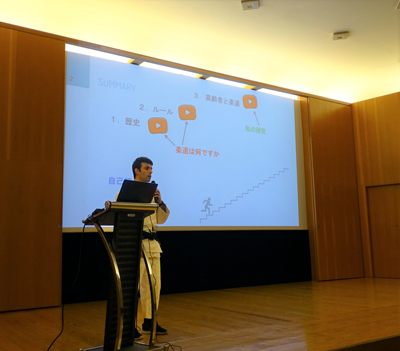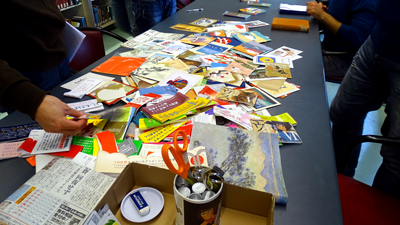2020 Japanese-Language Assistants’ Report: Increasing What Students Can Do in Japanese
The Japan Cultural Institute in Rome
SAITO Taki
The Japan Cultural Institute in Rome (hereafter referred to as "the Institute"), where I work as a Japanese-Language Assistant (hereafter referred to as "Assistant"), was established in 1962 as the world's first Japanese cultural institute and continues to play a central role in promoting Japanese culture in Italy. Through exhibitions, film screenings, stage performances, and the largest library in Italy dedicated to Japanese studies (hereafter referred to as "the library"), visitors to the Institute can experience Japanese culture while in Italy, and it is a place where people of all ages, nationalities and professions can gather and engage in active cultural exchange. The main role of Assistant here is to run the Japanese-language courses. My specific duties can be roughly divided into three categories: (1) teaching Japanese-language courses, (2) managing Japanese-language courses and supporting local teachers, and (3) planning and implementing Japanese language related events. I would like to report in detail on that third role.
Initiatives to Increase What Students "Can Do in Japanese"
In all Japanese classes at the Institute, we currently use the book "Marugoto: Japanese Language and Culture" (the official course book of the Japan Foundation, which complies to the JF Standard for Japanese-Lanaguage Education). We are not just teaching grammar and vocabulary, but are also holding lessons that aim to address the goal of increasing the amount of Japanese that students are able to use in actual situations. However, it is not easy for learners living in Italy to actually have the opportunity to use Japanese in their daily lives. Therefore, we try to actively plan and implement events where learners can use Japanese outside of class and interact with native speakers. These events are left to the Assistant to plan and implement, and one of the appealing aspects of the task is that, with the cooperation of other Institute staff, one's idea takes shape. In addition to the monthly Japanese conversation group "Wai Wai Shaberi Amo" and the "Japanese Wide-Reading Group," which have been held continuously for several years, the following two new initiatives were implemented in 2019.
Japanese Language Presentation, "Let's share our 'likes'"
In the Japanese language courses at the Institute, students in all courses are encouraged to create a Japanese language learning portfolio. A portfolio consists of three areas: (1) a "Can-do" checklist, (2) products of the student's study, and (3) records of cultural experiences, and is used to record one's own study results. Through the creation of these portfolios, I noticed that there were students who were highly motivated to express their interests in Japanese language and culture and to create things, and I wanted to provide an opportunity for these students to give presentations about their interests, so I planned this event separately from the class. We also thought that the presentations would provide an opportunity for the students to make connections and interact with each other. During the course, I sought volunteers to give presentations and received three candidates who gave presentations on three different topics: "Judo," "My favorite Japanese idols," and "Knitted stuffed animals (my hobby)." After the presentations, the presenters' faces were filled with a sense of accomplishment, and I'm sure it was a great inspiration to the other students who came to listen to the presentations.

A student giving a presentation on judo
Japanese Reading Group "Circolo di lettura in lingua"
We wanted to provide an opportunity for intermediate and advanced learners inside and outside the Institute to enjoy the Japanese text as they read novels, so we held regular Japanese reading sessions in cooperation with the librarian. We named the event "Circolo" (circle) so that book lovers could gather and feel free to participate at any time, and we had them read the selected book (in the Japanese version) in advance and discuss the work's contents in Japanese on the day of the event. We also tried to promote cultural exchange between Italy and Japan by inviting native speakers of Japanese to participate in discussions with students. In 2019, we held two sessions, in November and January, featuring short stories by Hiromi Kawakami and Ryu Murakami, respectively, which led to heated and lively discussions among participants. After the discussions, each of the participants expressed their impressions of the work in the form of a "zine" booklet and gave presentations on them to each other, which deepened their understanding of the work. Due to the spread of COVID-19, this event could not be held in person at the Institute from March 2020, but we intend to hold it online from April. We believe that the online format will have effects that could not be achieved in an in-person format, such as participation from not only all over Italy, but also from Japan and other countries.

Activities that use illustration and collage to express impressions of a work
Through my two years of work at the Institute as an Assistant, I was able to engage in Japanese language education from a position that was quite close to that of the Italian students. I think I was always thinking about and trying to respond to what kind of information learners were looking for, what they were struggling with, and what they wanted to achieve. I would like to make use of this experience to develop myself so that I can look at Japanese language education from a broader perspective than just the students in front of me.
- What We Do Top
- Arts and Cultural Exchange [Culture]
- Japanese-Language Education Overseas [Language]
- Japanese-Language Education Overseas [Language] Top
- Learn Japanese-language
- Teach Japanese-language
- Take Japanese-Language Test
- Know about Japanese-language education abroad
- The Japanese-Language Institute, Urawa
- The Japanese-Language Institute, Kansai
- Japanese-Language Programs for Foreign Specified Skilled Worker Candidates
- Japanese Language Education for Japanese Children Resident Overseas and for the Descendants of Migrants
- Archives
- Japanese Studies and Global Partnerships [Dialogue]
- JF digital collection
- Other Programs / Programs to Commemorate Exchange Year
- Awards and Prizes
- Publications
